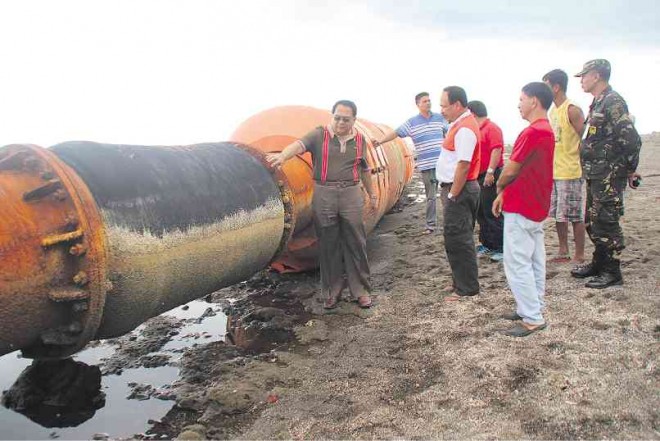
SAFETY ISSUE Zambales Gov. Hermogenes Ebdane Jr. inspects a portion of a floater assembly, a device used in dredging operations, that was found in the province’s waters last week. The assembly is kept in Barangay San Agustin in Iba town. CONTRIBUTED PHOTO
SUBIC, Zambales—The interlinked buoys and metal pipes found in Zambales’ waters last week were part of dredging equipment, an expert in the manufacture of industrial rubber and fiberglass pipes said.
Erwin dela Torre, a former top executive of a company that manufactures equipment similar to those found here last week, said the device is called a “dredge floater assembly,” which is composed of suction and discharge components.
He said a dredge floater assembly is attached to a dredging machine while sucking up sand from the sea bottom. The device has three interlinked parts—a pipe, floater and connector.
“I believe these objects were used in reclamation activities [in the West Philippine Sea],” Dela Torre said in a telephone interview on Wednesday.
Zambales fishermen first saw the objects, which local authorities earlier mistook for oil containment booms, some 5.5 kilometers (3 nautical miles) from the shoreline of Cabangan town on Friday last week.
Several fishermen said they believed the objects could have been washed away from the Scarborough Shoal, since they saw similar objects near that area.
The shoal, also called Bajo de Masinloc or Panatag Shoal, is among the disputed territories in the West Philippine Sea. It is 230 km (124 nautical miles) west of Zambales.
Chinese markings
Fishermen from the provinces of Zambales and Pangasinan said they had been driven away by Chinese Coast Guard personnel from the shoal, a rich fishing ground for locals.
Dela Torre said the floater’s exterior is made of fiberglass while its interior has a foam that does not absorb water, he said. “The floaters are designed to carry the weight of the pipes, which are made of either metal or hard plastic,” he said.
The dredge floater assembly spans a kilometer long, with each floater measuring 2 meters in diameter.
Zambales Gov. Hermogenes Ebdane Jr. said the objects recovered in the province must be compared with the equipment reportedly being used by China in its reclamation activities in the West Philippine Sea, such as in the Reed Bank.
“Unless China claims ownership of these objects and shows proof, it’s too early to say that these can be used as evidence [against its incursion into the West Philippine Sea],” Ebdane said.
He said even if the recovered device bore Chinese markings, “nothing is definite” about its origin.
“We’re waiting for someone to claim these objects but until now no one has done so,” Ebdane said.
The governor has ordered the dismantling of the objects, which had been towed to the capital town of Iba, saying these pose a risk to residents near the shoreline.
“For safety reasons, I already asked for the dismantling of these. These have to be taken out of the shore,” Ebdane said in a telephone interview. “Considering the weight of these objects, these are perilous during high tide and bad weather because these may hit houses along the shoreline.”
He said the device would be removed from the shore using a backhoe or a crane.
Boundary markers
“Based on what we’ve seen, these objects could be used to mark boundaries or to prevent waves from coming in,” said Ebdane, a former secretary of the Department of Public Works and Highways.
He said the objects could also serve as temporary barriers in case of an oil spill.
“It’s also possible that this kind of floating objects can be used for large-scale reclamation because these could be used to suck up sand if attached to a machine,” he said.
Ebdane said the device would be kept in the shores of San Agustin and Sto. Rosario villages in Iba town. “If no one claims it, then it may be given to the fishermen who found it,” he said.